Sample Lecture Recordings
American Social History (1959)
Lecture 34 (52:19)
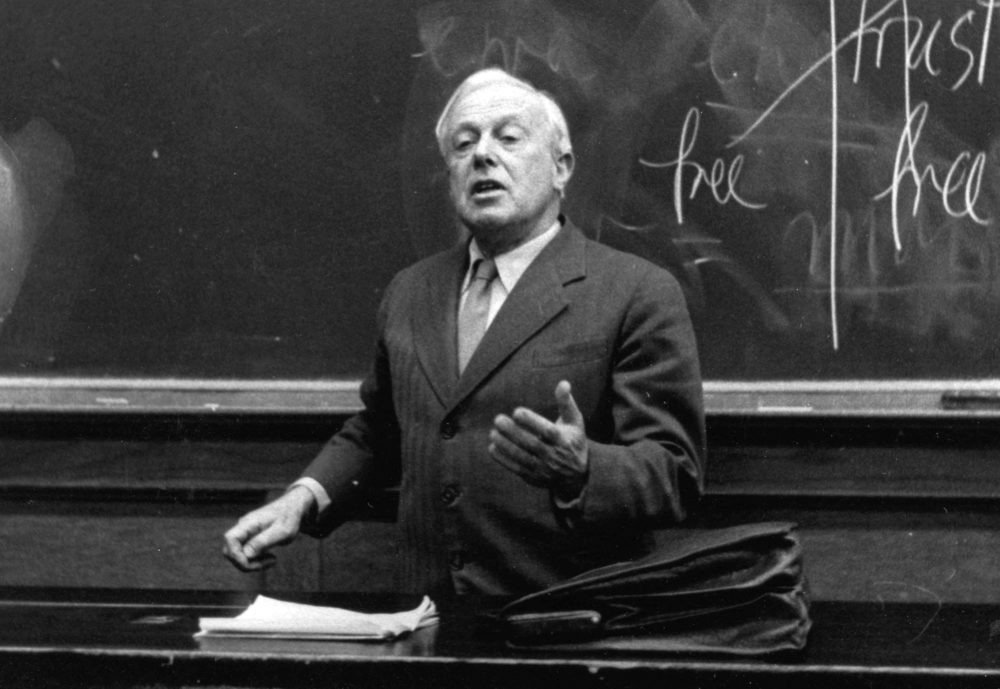
Sample Transcript:
I was asked yesterday to explain why history was not a science. And I think when we now come into this profound problem of the color question in this country, and the labor question in this country, and the immigrant question in this country, and the children's question, the juvenile delinquents in this country, and all the other minority issues, it is just as well to remind you once more that we cannot know of any one of these things in a scientific way, because history is not a science…
Somebody has to tell you this, that it is nonsense to call history ""a science." ...Here is your human mind, and here are the objects which we try to penetrate. The object is, at the outside, you see, as a phenomenon, as an appearance… and we try to make it transparent.... We mathematize nature… and we see electronic machines today… it seems possible to… to reach into our own animal nature and declare parts of ourselves as pure mechanisms, in so many numbers. Now the historian has the opposite task. Here are events, and here are you, your mind. And the darkness, and obscurity, and the obtuseness is in you. The events are living events.
Circulation of Thought (1954)
Lecture 1 (1:15:24)
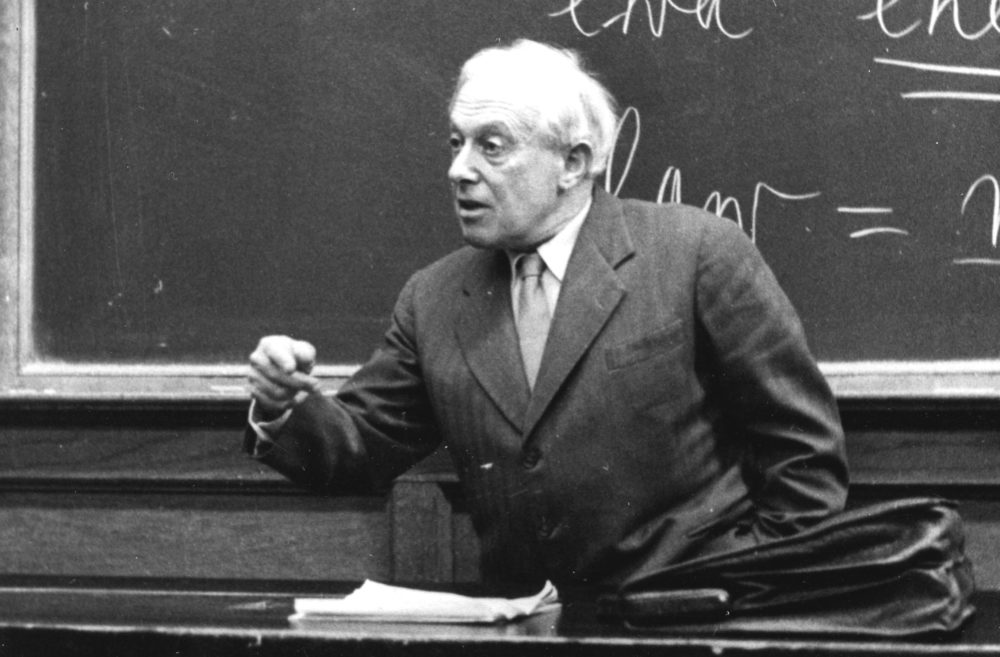
Sample Transcript:
You all believe in logic. I do not, because if I believed in logic... logic would be superior to me. But man is superior to his thoughts. And just as the temperature of the environment has to come under control of my own body, you see, so that I'm no longer cold just because the environment is cold, but I have my 98.6 degrees... In the same way, thought only begins to circulate, gentlemen, if you can take up thinking and dismiss thinking at your own will...
If logic is a master, then you couldn't be, but logic isn't a master. What is a master? That's the topic of this course. Logic is not the master,because it would mean that our thoughts would dominate us. The topic of the course is to show you how you become masters of your thoughts.
Comparative Religion (1954)
Lecture 28 (1:42:53)
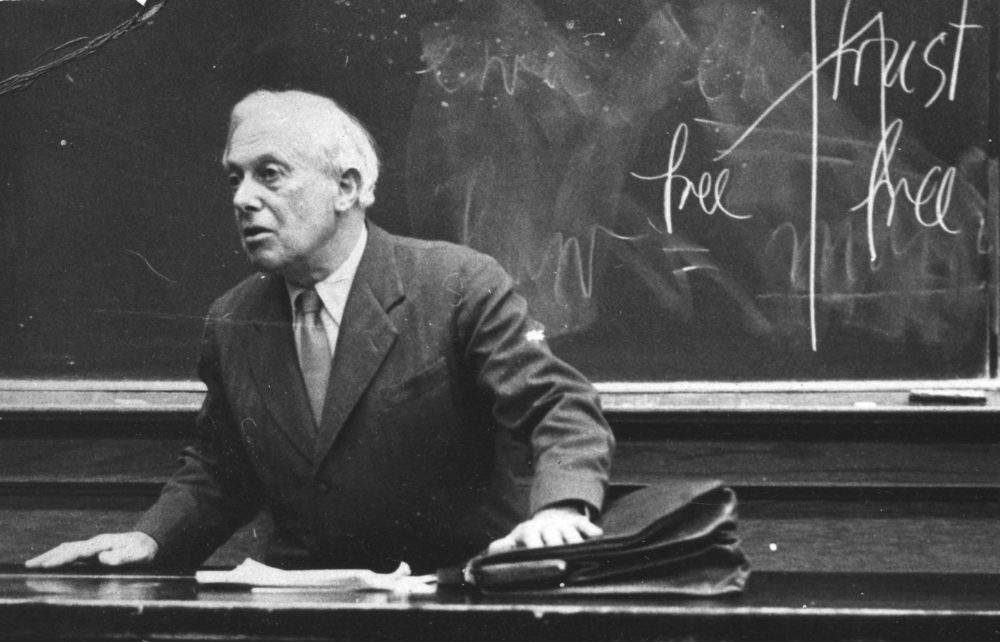
Sample Transcript:
Has anybody read "West Running Brook," by Robert Frost? I think it's one of his profoundest poems. I advise you to read it. I shall use it today--only one line of it--to show you how difficult it is for even a well-meaning, open, young fellow today to get the first glimpse of the religious problem… It has not directly something to do with this course. But I think it sums up very well the the hopelessness of giving a course on other people's religion to people who do not pray, who do not know what prayer is, who laugh, or are silent, or indifferent to this whole problem that in our veins the sap of thousands of years of mankind's history is running.
Cross of Reality (1953)
Lecture 24 (1:28:58)
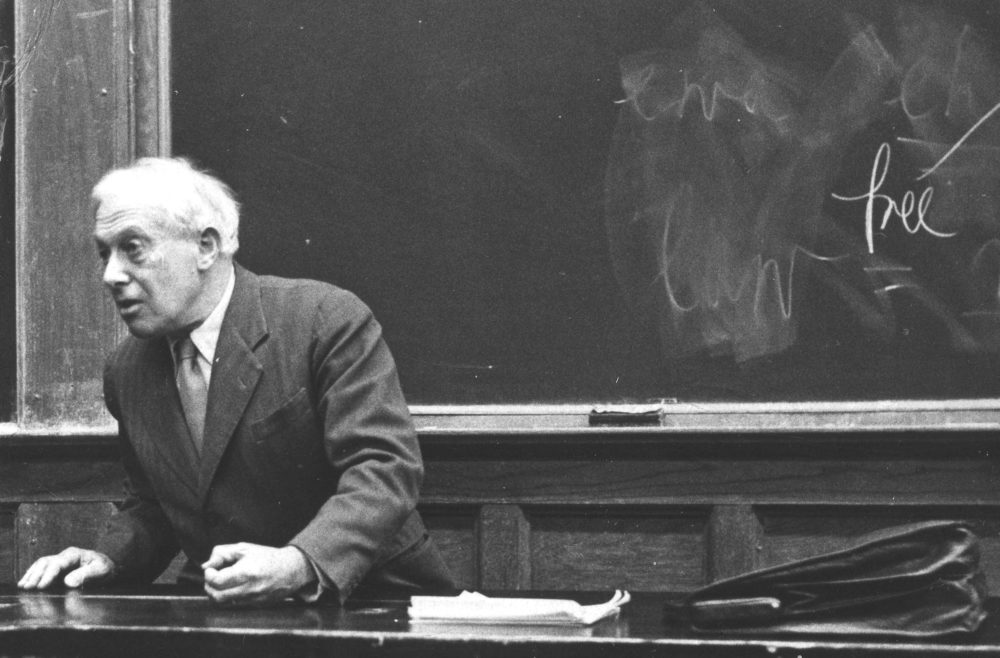
Sample Transcript:
I want to be as brief as possible about these four religious leaders: Buddha, Abraham, Lao-Tzu, and Jesus. I talk to you really on Lao-Tzu because he's the most foreign to you. And unfortunately, as you know, such people have been treated always as Chinese, or as Jews, or as Christian.
Now obviously their whole meaning is that they do not belong to China, or to India, or to Israel, but that they have anticipated our destiny. And human destiny certainly is not concerned and not interested in our background or our origins. But it is interested, as the name itself says, in a time in which we will have fulfilled our role within humanity.
Mass Media’s New Methodism
(8:45)
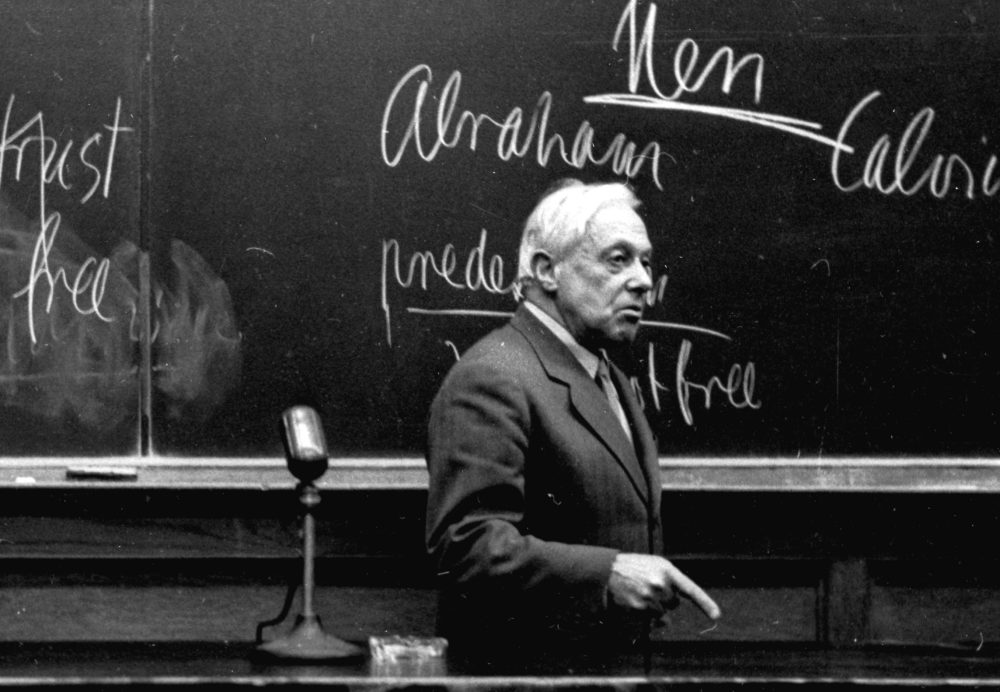
Sample Transcript:
And you don't even know that this is criminal, what these newspaper editors do. They haunt you every day with another crime. You know nothing but this. You only hear in politics and everything, the crime… You think the Americans are on top, and dominate the world now, and the English are finished. I can say one thing to you: the hydrogen bomb will not be thrown over England, but it will be thrown over this country.
There is no country in the world that is in greater danger than the United States. Europe is absolutely safe, because Russia wants to have Europe. It doesn't want to destroy it. But it does want to destroy this country, because we are rich. The poor today are safe. The rich are in danger. It's all nonsense what you say, "Europe is done." We are done, if we go on like that. Europe is absolutely safe. Nobody's going to destroy it.
Technology and Peace (1966)
(1:10:45)
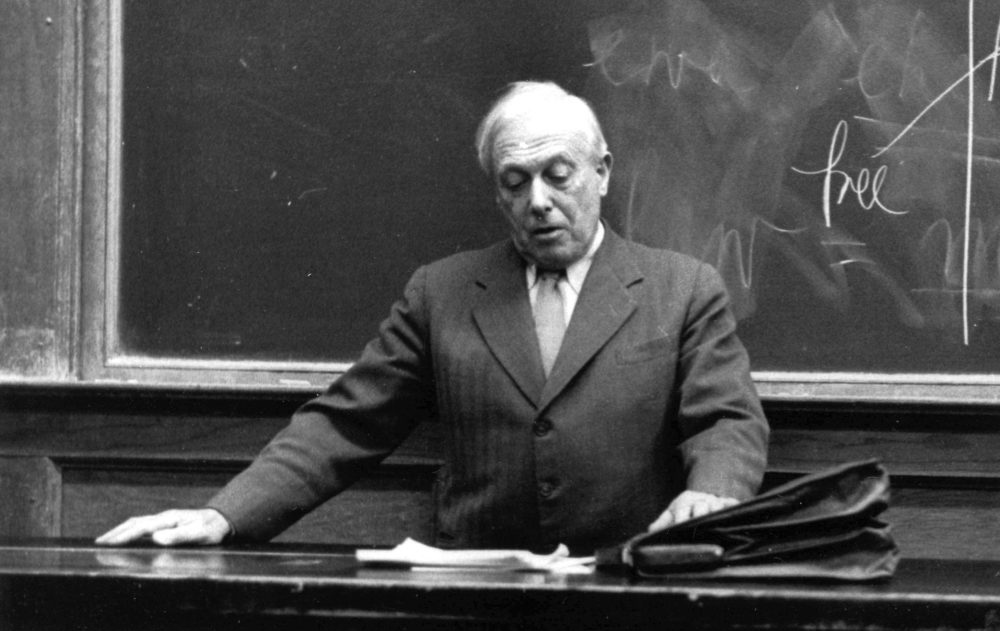
Sample Transcript:
And unfortunately the do-gooders don't know this, the charitable people, that this is not a charity, this Peace Corps business. It's not just a beneficiary. It is inevitable. It is indispensable, because any technical innovation expands the space in which we move, shortens the time in which we can achieve the change, and destroys a familiar group--a family, or a village, or a town, or a country.
This simple rule, which I have preached for the last 20 years, is quite inaccessible it seems to philosophers, who don't see the forest for the trees... You can observe it, however, yourself and then you will understand what you are up against: why you have to go to India, why it is not a charity that we go there, because we destroy. Technical progress destroys parcels of life, structures of togetherness, of solidarity.
Universal History (1956)
Lecture 6 (1:44:58)
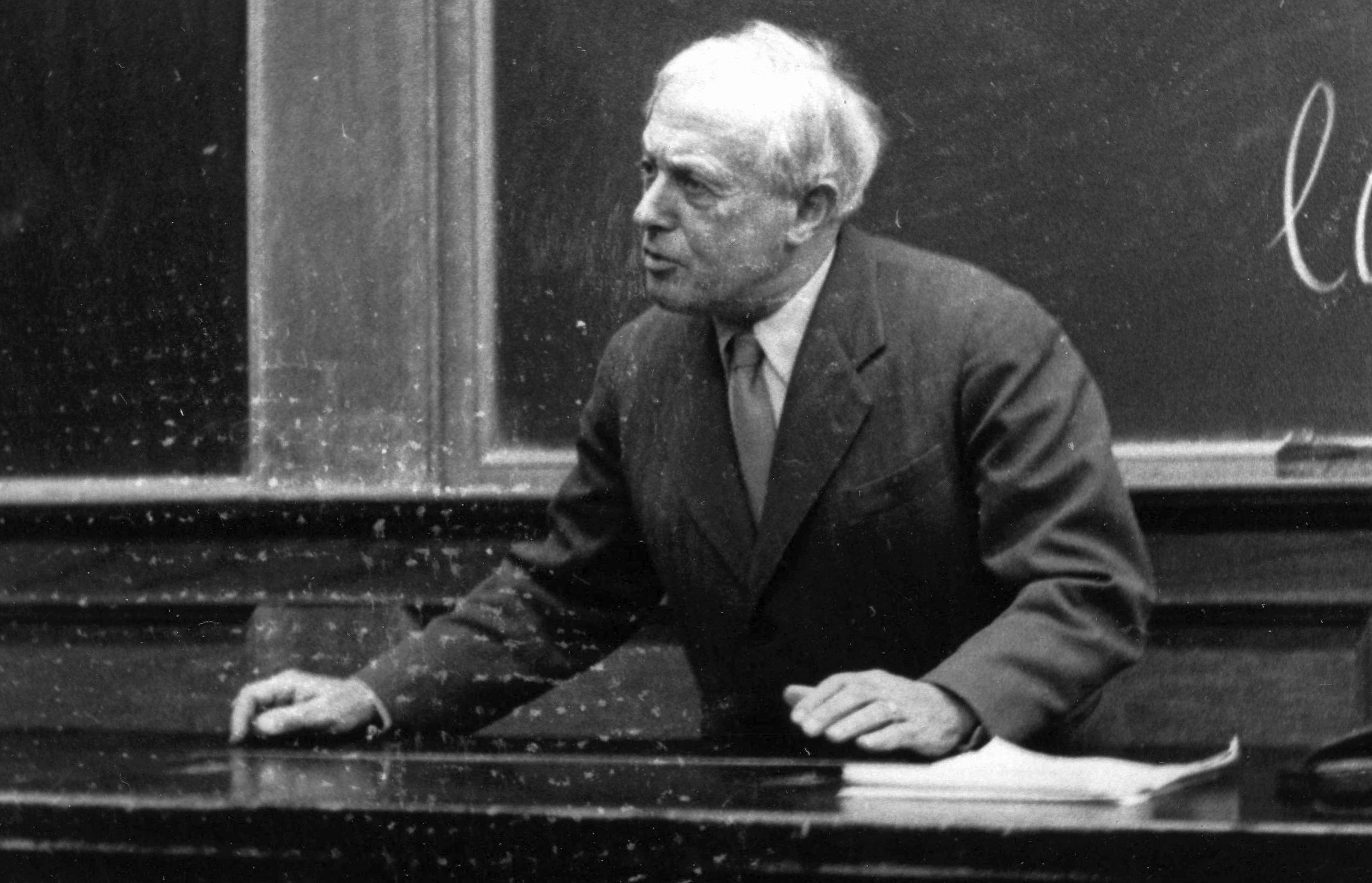
Sample Transcript:
Since the days of Christ, mankind has joined its creator in admitting that every day is creation... At this moment, the Creator is still creating. That's the difference between the Christian era and all the past, that there they try to have certainties. Of course, most people today live in the pre-Christian era...
I tried to show you that every one of you can relapse into the pre-Christian era. Most of you do. One studies the Greeks. The other studies the Bible, the other studies sports, and goes back to the red Indians. The other is out for power and the state department, and the great issues... That's all pre-Christian. It has absolutely nothing to do with Christianity. The Christian era says that all these things are in order, as long as they are subordinated to the fact that creation is now.
Universal History (1956)
Lecture 9 (1:31:13)

Sample Transcript:
Mr. Eisenhower wrote a book called Crusade in Europe. That is, he still remembered that the second millennium began with crusades. So the first people who conquered the world outside this little remnant of Christianity in Central Europe, where as you know, the Frankish knights who went to Jerusalem, and began to round out again a world in which the Cross could be lived. And so the type of the Crusaders, gentlemen, is an eternal type...
The Knights of Columbus still think that Christoph Columbus came as a crusader to America, and he, in a certain way, even thought of himself as a crusader. Yet, you would hardly call him a Crusader proper: he doesn't go to Jerusalem, he discovered. And the second phase then, is a discoverer. We have, after the world was discovered, two more types of people who have unified the world: the explorers, and we still have them with us; and last, the inventors, because the inventors also discover part of the world, but in the interior, at the bottom of the sea, at the bottom of the earth. A geologist who finds a ways and means to drill oil, would come in this last class.
So we have a parallel, gentlemen… Now these four classes of people, gentlemen, are the secular form of the same process which the martyrs, and the Fathers, and the monks, and the kings fulfilled in the Church.
Universal History (1957)
Lecture 11 (1:18:35)
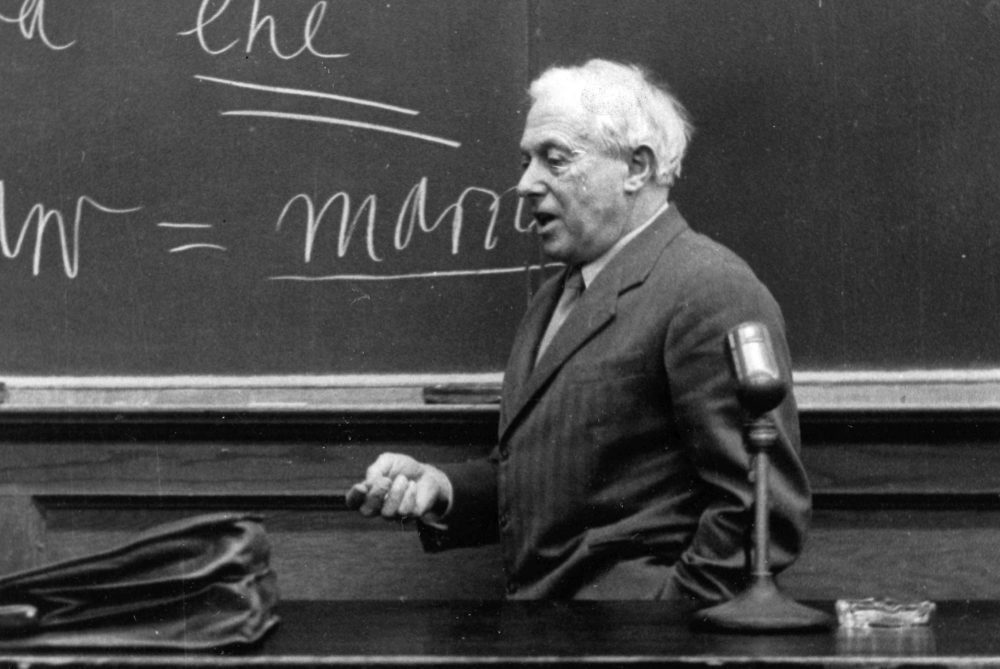
Sample Transcript:
I'm going to Europe this summer with the idea of founding a periodical called, "The Epoch," in which I will look for three editors of three generations, in which I'll try to contrive that a man of 70, or 50, and of 30 are writing in their own style, as opposite as possible, on the same topic, to make sure that it will never happen again that the world is split into the Wilsonian era and the Rooseveltian era, which is the tragedy, in this country.
Mr. Roosevelt woke up here, every morning of his life, and said, ""What do I have to do, not to repeat the political mistake of Wilson, who was right in purpose, and wrong in his means?"" He would never mention him in public, but he had them all in here, before his mind. And that is why we are so sterile, gentlemen, because it wasn't out in the open that Wilson's program had to be carried out--as you see now in the United Nations very clearly--and that nobody would allow any human being in this wonderful, fantastic era, from 1921 to 1939, to mention this fact, because people lived happily hereafter in this mythical time of today.
